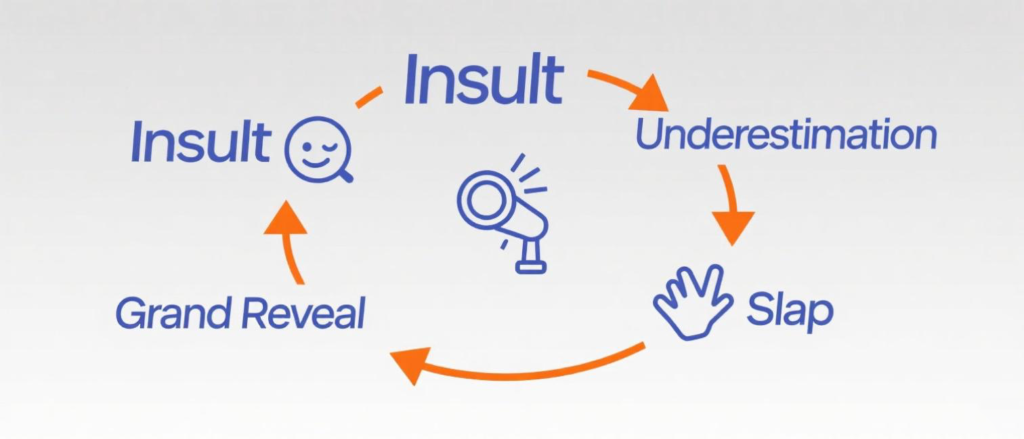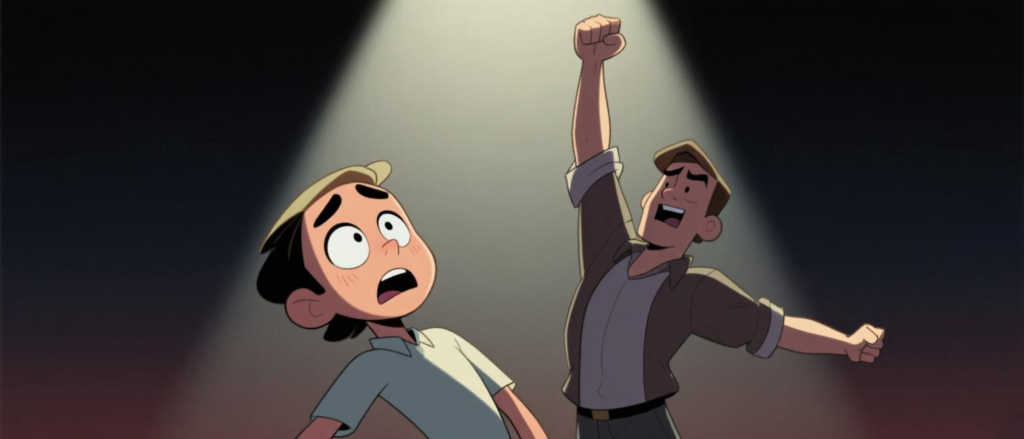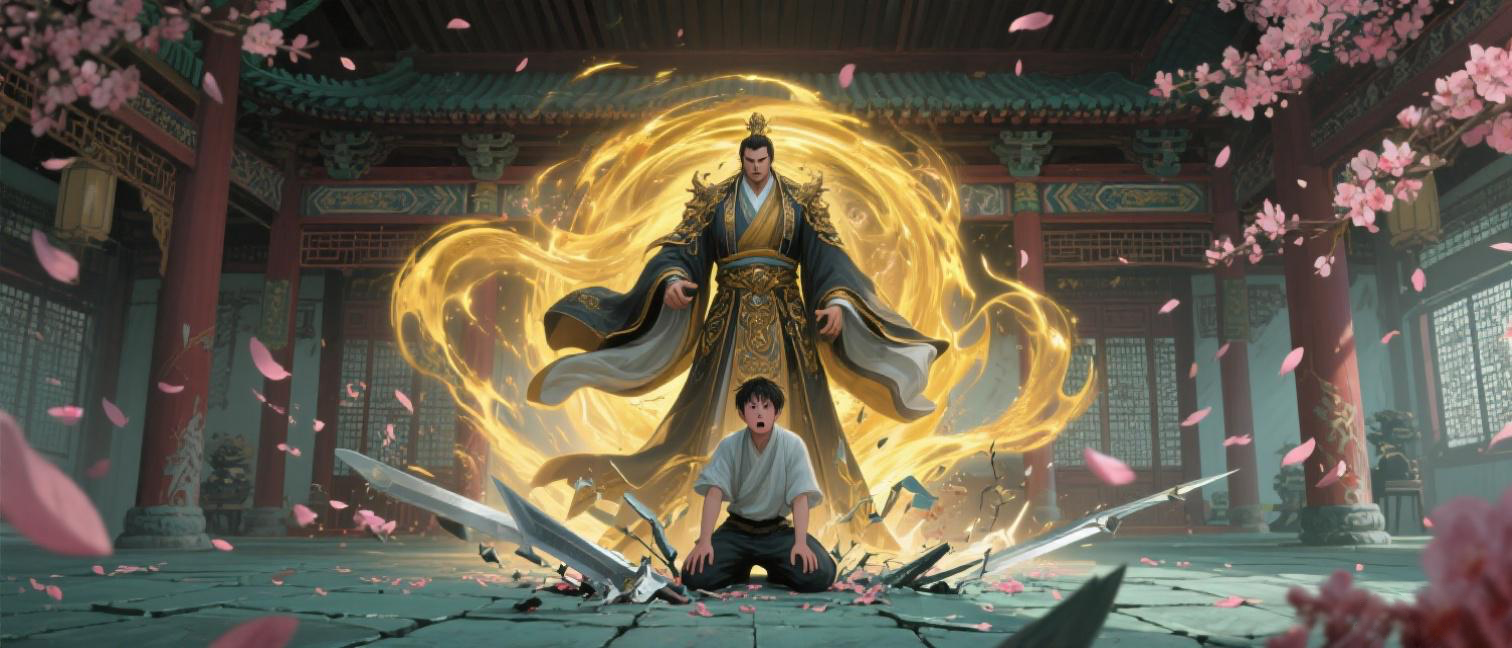The face slapping trope is a cornerstone of Chinese webnovels, a narrative device so popular it has become a genre in itself. Have you ever found yourself utterly frustrated as the protagonist is mocked, humiliated, and looked down upon by arrogant villains? You keep turning the pages, not just for the plot, but for that glorious moment of vindication. This unique and deeply satisfying narrative event is more than just revenge; it’s a core component of the power fantasy that defines the genre. It’s the instant gratification that makes these stories so addictive. But what exactly is “face slapping,” and why is it so compelling?
This unique and deeply satisfying narrative device is more than just revenge; it’s a core component of the power fantasy that defines the genre. It’s the instant gratification that makes these stories so addictive. But what exactly is “face slapping,” and why is it so compelling?
What is “Face Slapping”?
In Chinese novels, “face slapping” (打脸, dǎ liǎn) is the act of publicly humiliating someone who has previously ridiculed or belittened the protagonist. It’s the ultimate reversal of fortune, where the hero, once underestimated, returns with overwhelming power to prove their detractors wrong. It’s a moment of righteous vindication, a public spectacle that leaves the audience cheering.
The trope typically follows a predictable, but beloved, pattern:
- The Insult: A powerful young master, an arrogant elder, or a childhood rival publicly mocks the protagonist’s lack of talent, low status, or humble background. The insult often takes place in front of a crowd, amplifying the protagonist’s humiliation.
- The Underestimation: The antagonist dismisses the protagonist as a “waste” or someone utterly insignificant, setting a low expectation for the hero’s abilities.
- The Grand Reveal: The protagonist, who has secretly been cultivating or acquiring hidden treasures, reveals their true strength. This reveal is often a dramatic display of a skill they were supposedly weak at, completely shattering the antagonist’s preconceived notions.
- The “Slap”: The antagonist is left speechless, their face reddened with shock and embarrassment. Their public disgrace is the “slap” that brings justice and sweet revenge for the protagonist’s earlier suffering.
This simple formula is the bread and butter of almost every cultivation novel because it taps into a fundamental human desire for justice and recognition.

Why We Love It: The Psychological Appeal
The appeal of the face slapping trope goes far beyond a simple desire for revenge. It’s deeply rooted in psychological and emotional satisfaction.
1. The Triumph of the Underdog: Most Chinese webnovel protagonists start as an underdog. They may be a “waste” with a broken dantian, a low-ranking disciple in a powerful sect, or a young man from a backwater village. We connect with their struggles and feel their pain. When they finally “slap face,” it’s not just their victory—it’s ours. We feel the triumph of the common person over the arrogant elite, a timeless narrative that resonates universally.
2. Instant Gratification: Unlike complex literary fiction, these novels offer immediate rewards. The emotional payoff from a well-executed face slap is instant and intense. There’s no need to wait for a long, drawn-out revenge plot. The action is swift, satisfying, and moves the story forward with momentum.
3. Validation of Hard Work: In a cultivation novel, the protagonist’s rise to power is a result of their own grit, determination, and often, near-death experiences. The face slap is a public validation of all that hard work. It proves that talent and background are less important than sheer effort and willpower. It’s an aspirational message that hard work pays off, even when the world seems to be against you.
“Face Slapping” as a Plot Device
The trope is so prevalent because it’s an incredibly effective tool for protagonist development and driving the plot.
A. Character Growth: The face slapping moment marks a clear milestone in the protagonist’s journey. It’s a point where they transition from a victim to a victor, demonstrating their newfound power and confidence. Each “slap” is a testament to their growth, both in power and character.
B. Pacing and Excitement: The anticipation of the face slap keeps the reader hooked. Authors deliberately build up the tension, adding more and more insults, to make the eventual reveal even sweeter. This constant cycle of insult and revenge creates a dynamic pace that prevents the story from becoming stagnant.
C. Establishing a Power Scale: Face slapping moments are often used to show the protagonist’s new level of strength. By defeating a previously unbeatable foe, the hero establishes their place in the hierarchy and gives the reader a clear sense of how far they’ve come. It’s a crucial way of demonstrating the power fantasy at work.

The Best “Face Slapping” Moments in Novels
While the trope is common, the best examples are executed with finesse. These moments are not just about brute force; they’re about intelligence, wit, and perfect timing. They might involve the hero casually revealing a skill they were previously said to lack, using an unexpected secret technique, or simply winning a competition with an ease that shocks everyone.
These are the scenes that readers will re-read and remember long after they’ve finished the book. They are the climax of an emotional arc, the reward for the reader’s patience, and the perfect encapsulation of the genre’s appeal. To dive into more of these exciting novels, check out our article on the Top 10 Chinese Web Novels of 2025: Must-Read Fantasy & Xianxia Endings!.
For more in-depth information on the history and cultural roots of Chinese webnovels, you can explore the Wikipedia page on Chinese web novels.
Conclusion
The face slapping trope is far more than a simple plot device. It’s the heart of the modern Chinese webnovel. It speaks to our desire for justice, validates our belief in the underdog, and provides an addictive dose of instant gratification. For new and veteran readers alike, waiting for that moment of vindication is a crucial part of the reading experience, making these novels not just stories, but a thrilling journey of emotional release and satisfying revenge.
